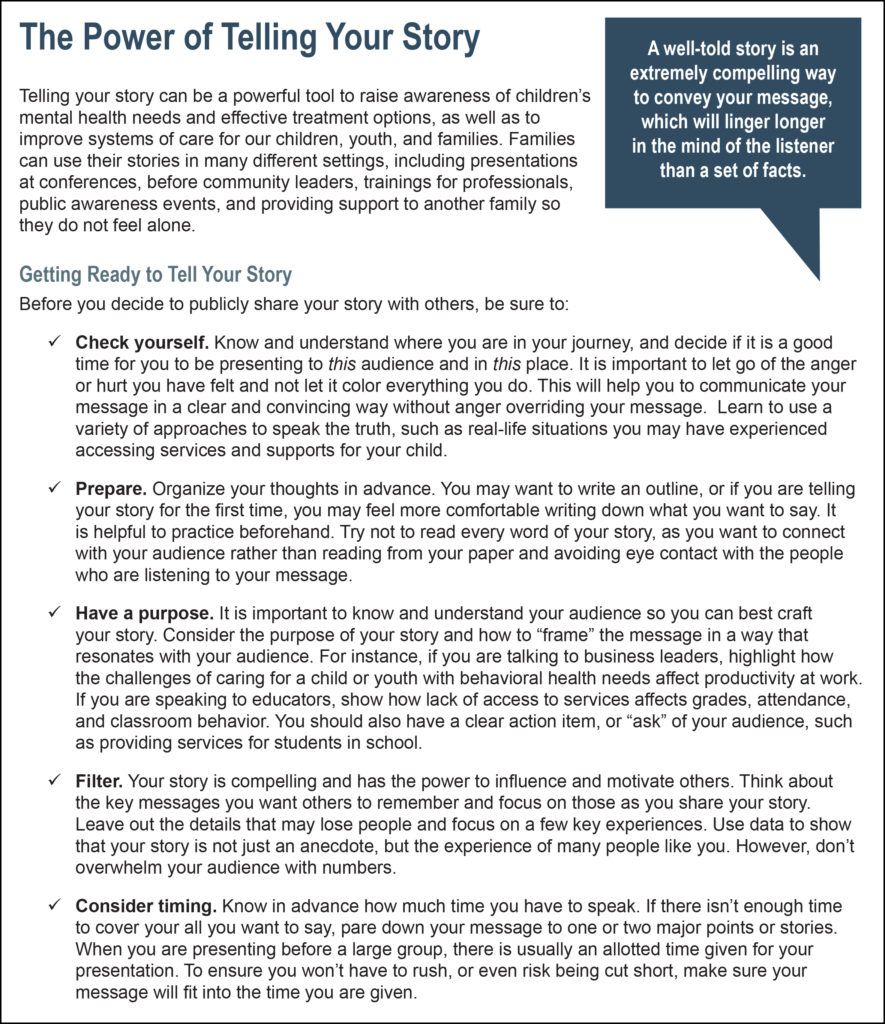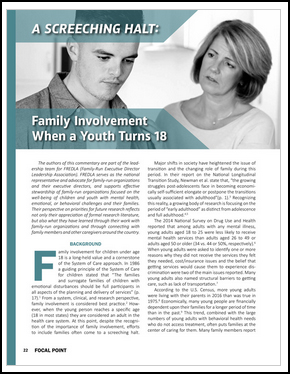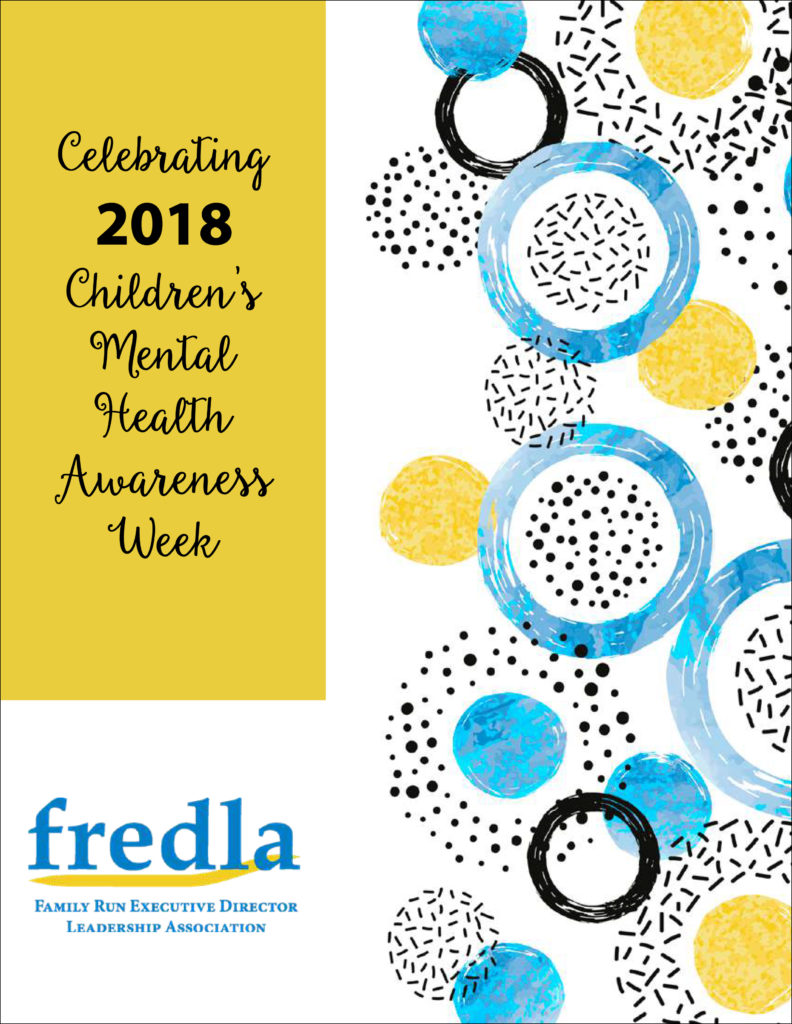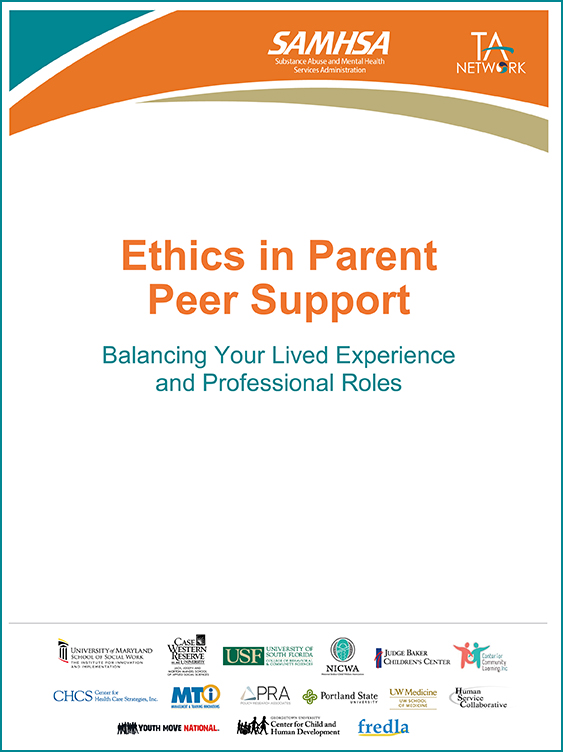FREDLA Publications
Resources Developed by FREDLA
Valuing Parent Peer Support
We asked Parent Peer Support Providers what being valued looked like to them Read their responses and try new ways to show your appreciation. Read Here
Lead Family Coordinators in a System of Care
The Lead Family Coordinator (LFC) role is a requirement of the System of Care (SOC) Expansion and Sustainability Grants (also known as the Children’s Mental Health Initiative) funded through SAMHSA. Filling this position demonstrates a commitment to the value of a family-driven system for children, youth, and young adults with mental health, substance use, and multi-system challenges. This document includes information and strategies to successfully hire and supervise LFCs and to maximize the benefit of having this role. Read Here
Outcomes that Matter
This report shares the results of a PCORI funded nationwide project to identify what outcomes caregivers and youth most hope to achieve from accessing mental health services. Read Here
This infographic depicts the outcomes identified through the PCORI funded project described above. Read Here
Points for Parents Considering Residential Care
A document to help families make informed decisions about out-of-home care for their child or adolescent. The publication reflects the insights of parents who have faced decisions about residential care and contains a checklist of important things for parents to consider. Read Here
What We Need in Order to Support Young People
A collective message from mental health and substance use providers, family-run organizations, and parent peer support specialists. Read Here
Youth and Parent Peer Support
What it takes when working with the same family
A 2023 report was developed in partnership with the Youth Move National Peer Center. The report summarizes discussions with dyads of Youth and Parent Peer Support providers to learn about their experiences when working with the same families. Read Here
Family Involvement, Family Engagement, and Family Driven Partnership:
What does it look like in residential care? To learn more about the continuum, Read Here
Family Engagement in Systems
Implementing the values and principles of a system of care requires family experience and expertise be embedded throughout all aspects of a system. Where to begin and how to make it happen in systems is often a challenge. This infographic highlights the key components of engaging families successfully in any child-serving system. Read Here
Ten Tips on Outreach to Families
Family-run organizations have a rich history of connecting with families to share information about services, support, and opportunities available through their organization. Experienced family leaders contributed to the tips listed in this infographic. Read Here
Parent Peer Support (PPS)
is a critical part of the service array for children, youth and their families. The roles for PPS providers are expanding as the value of PPS is recognized in more systems. This short video, developed in partnership with The Institute for Innovation and Implementation at the University of Maryland School of Social Work, outlines the scope of activities in PPS and the roles of PPS providers in working with families and other professionals.
Advocating for Comprehensive School Mental Health

During the past year our children and youth have experienced increasing mental health needs resulting from school disruption, social isolation, fear of illness, and loss due to COVID-19. Now more than ever family members and family-run organizations must use our voices to advocate for comprehensive school mental health systems that provide a full continuum of behavioral health supports for all students.
FREDLA is pleased to release three advocacy tools developed in partnership with the National Center on School Mental Health for families to use in educating and advocating with school administrators, superintendents, school boards and state legislators to advance comprehensive school mental health systems. Every child in every school should have access to mental health promotion, early intervention and treatment. Together families can make it happen!
FREDLA Releases Videos Showcasing the Powerful Impact of Family-Run Organizations & Parent Peer Support
Supporting Families of Children with Behavioral Health Needs in Schools – Allegheny Family Network, Pennsylvania
Supporting Families of Children with Behavioral Health Needs in Child Welfare – Federation of Families, Miami-Dade, Florida
Supporting Families of Children with Behavioral Health Needs in Juvenile Justice – Family Involvement Center, Arizona
Coping Under Covid-19: Managing Behavior and Having a Safety Plan for Children and Youth with Behavioral Health Needs When Staying at Home
Social distancing and staying at home presents additional challenges for families caring for a child or youth with mental, emotional and behavioral health needs. The inability to go out and meet with friends, participate in activities and go to school can escalate behaviors at home. Additionally, the fears about the virus may heighten depression or anxiety for some children and youth.
Parents can help ease tensions and volatility at home by thinking through some practical strategies.
2019 Survey of Family-Run Organizations – Summary Info-graphic
In 2019, FREDLA conducted the third biennial survey of family-run organizations. The information gleaned is powerful, documenting the capacity of family-run organizations to reach families, have an impact on their lives, and positively influence child-serving systems. To find out more, download FREDLA’s Summary of the 2019 Survey of Family-Run Organizations.
FREDLA is grateful to the 50 family-run organizations that took time to complete the survey! Read Here
Parent Peer Support Info-graphics – Activities & Roles Across Systems
FREDLA is pleased to offer two new info-graphics highlighting the roles and functions of PPSPs for use in developing and strengthening parent peer support programming in your community. The Parent Peer Support Activities info-graphic outlines the most common activities of PPSPs across the nation. The Parent Peer Support Provider Roles info-graphic details the variety of roles and positions of PPSPs from the least intensive to most intensive level of services in the child-serving systems. For further information or additional resources on parent peer support, please contact us at info@fredla.org.
Parent Peer Support (PPS) is a crucial service for families who have a child or youth with social, emotional, behavioral or cross-systems challenges. PPS is a distinct service rather than an enhancement to other service models. PPS is provided by a primary caregiver of a child/youth with emotional or behavioral challenges who has been trained to use his/her lived experience to support other families, regardless of the systems with which their child or family is involved. Parent Peer Support Providers (PPSPs) have a range of roles throughout service arenas; from community outreach and education to emergency departments and inpatient treatment. There are promising outcomes associated with PPS, including:
Parent Peer Support Providers help parents:
- Have a better understanding of the challenges and resources associated with children’s mental health concerns (Robbins et al, 2008)
- Reduce the rate of missed appointment and premature terminations from treatment thereby reducing overall cost of treatment when compared to teams without a Parent Support Provider (Davis-Groves, Byers, Johnson, McDonald, 2011)
- Receive support from a workforce that is culturally aware of the needs of family members since they have similar experiences and come from the same community (Munson et al, 2009)
- Be more than four times as likely to be successfully reunified with their children than a comparison group without a PSP (Anthony, Berrick, Cohen, & Wilder, 2009)
For children, the use of Parent Peer Support Providers: - Increase the child’s early engagement with appropriate health resources (Koroloff , Friesen, Reilly & Rinkin, 1996)
- Reduced lengths of stay in foster care for children, and children will have a reduction in out of home placements (Marcenko, Brown, DeVoy, & Conway, 2010)v (Romanelli et al., 2009)
- Help children remain in kinship care or return to living with their families (CHCS Improving Outcomes for Children in Child Welfare, 2012)
- Remain in school rather than drop out (Kutash et al., 2010)
- Reduce recidivism in juvenile justice (Studies of Targeted Parent Assistance by American Institutes for Research; Kansas University School of Social Welfare)
Meeting the Needs of All Families
Each family is unique, leaving its members to be the only ones to define it – in their way, from their culture and through their truth. For children and youth with mental health needs, the definition is often complicated by circumstances that propel their journey among various living arrangements. The following resource is provided to highlight the unique needs of today’s diverse families.
2019 Listing of Parent Peer Support Provider Training and/or Parent Peer Support Supervisor Training by Family-Run Organizations
Family-run organizations (FROs) have a proven history of successfully hiring, training, supervising and retaining the parent peer support workforce. FROs are specialists in the field of parent peer support, and most have developed training specific to the role of the Parent Peer Support Provider (PPSP) and the PPSP supervisor. In November 2018, FREDLA surveyed local and statewide FROs to compile a list of organizations that offer PPSP training or PPSP Supervisor training curricula to other organizations. These curricula and/or onsite training are available for purchase directly from the FROs.
A number of private consultants or organizations have developed and offer curricula in the area of parent peer support. However, this list only includes curricula developed and offered by family-run organizations. Criteria for inclusion on the list are: 1) the curriculum is developed and owned by a family-run organization and 2) the organization makes it available to other organizations. Contact information is included for each curriculum for more details on purchasing the curriculum or training. Please note that this document is intended as a resource and is not an endorsement of any specific curriculum.
2019 List of Family Run Organizations
This resource is a listing of family organizations throughout the United States. The purpose behind this list was to create an easy way for families, organizations, agencies, service systems and states to identify the family organizations in their region or state.
A Report on Family Experiences with the Use and Monitoring of Anti-psychotic Medications for their Children
This report was prepared for the expert panel convened by Substance Abuse and Mental Health Services (SAMHSA) to develop a SAMHSA Guidance Document for Effective Implementation of Antipsychotic Medication Safety Guidelines in Children and Adolescents. The Family-Run Executive Director Leadership Association (FREDLA) conducted four focus groups of family leaders and caregivers to obtain family input for the expert panel. Twenty-three staff from family-run organizations that provide peer support to families with children who have mental and behavioral health challenges and five caregivers participated in the focus groups in February and March 2018. FREDLA staff obtained informed consent from participants and used a standard protocol to solicit information about families’ experiences with the use and monitoring of second generation antipsychotic medications (SGAs). Focus group participants represented families in 18 states. Focus group discussions were audiotaped and transcribed. Transcripts were coded and subjected the thematic analysis. The report summarizes the key themes, utilizing quotes from families who participated in the focus groups and makes recommendations for improving the use and monitoring of antipsychotic medications from the family point-of-view.
A Report on Family Experiences During Transition Years for Young Adults with Behavioral Health Needs
There is a crucial need to better understand families’ experiences during their children’s transition from the child mental health system to the adult mental health system. This transition typically occurs when youth are 18 to 25 years of age and coincides with developmental milestones for emerging adults, as well as changes in legal status that affects parental rights. Due to the lack of research on the benefits of involving family members in services during this transition, there are also few recognized best practices regarding parental involvement. Service delivery approaches in the adult system typically do not emphasize family involvement as a key component of treatment.
This report is a compilation of what we heard from family members through virtual discussion groups held across 10 states.

The Power of Telling Your Story
Telling your story can be a powerful tool to raise awareness of children’s mental health needs and effective treatment options, as well as to improve systems of care for our children, youth, and families. Families can use their stories in many different settings, including presentations at conferences, before community leaders, trainings for professionals, public awareness events, and providing support to another family so they do not feel alone.

“A Screeching Halt: Family Involvement When a Youth Turns 18” (2018)
By Jane A. Walker & Malisa Pearson
Family involvement for children under age 18 is a long-held value and a cornerstone of the System of Care approach. In 1986 a guiding principle of the System of Care for children stated that “The families and surrogate families of children with emotional disturbances should be full participants in all aspects of the planning and delivery of services” (p. 17).1 From a system, clinical, and research perspective, family involvement is considered best practice.2 However, when the young person reaches a specific age (18 in most states) they are considered an adult in the health care system. At this point, despite the recognition of the importance of family involvement, efforts to include families often come to a screeching halt.
Supporting Family Participation in Systems of Care
Family participation at all levels is a core value of the system of care for children and adolescents with mental and behavioral needs. Child-serving systems often seek the involvement of families but encounter challenges in recruiting and retaining families to participate on committees or advisory councils, review materials, or attend trainings. Sustained family involvement requires a commitment of the organization’s staff time, resources to support family participation, and development of written policies and procedures outlining how family involvement will occur.
FREDLA Spotlights Family Leaders Throughout the Country to Celebrate Children’s Mental Health Awareness Week 2018

More than 30 years ago, family members stepped forward to start a movement that would change the course for families caring for a child, youth or young adult with behavioral health needs.
To celebrate Children’s Mental Health Awareness Day 2018, FREDLA is putting a spotlight on 20 family leaders across the country who have worked in their states, communities and tribes. Some leaders were involved in starting the family movement while others are new to the family movement. Take a moment to read their stories. You will be inspired and amazed by these strong and dedicated leaders.
“Leadership is not about titles, positions or flowcharts. It is about one life influencing another.” — John C. Maxwell
On Children’s Mental Health Awareness Day and everyday FREDLA thanks all of the family leaders across the country for the work they do to support families and improve systems of care for our children.
ETHICS IN PARENT PEER SUPPORT WORKBOOK:
Balancing Your Lived Experience and Professional Roles
Ethics refer to a set of principles, rules, or standards for the conduct of a person or the members of a profession. An ethical dilemma occurs when a person must decide between two or more courses of action. Taking either course of action may have consequences or violate rules, beliefs, convictions, or commonly accepted practice. Deciding upon the best and most appropriate outcome is the core of an ethical dilemmas.

Parent peer support partners are frequently faced with ethical dilemmas when working with families, in their workplace and in the community. The Ethics in Parent Peer Support Workbook is a tool to help new and seasoned parent peer support providers practice handling ethical dilemmas
The Workbook was developed by the Family Run Executive Director Leadership Association (FREDLA) under a contract with the National Training and Technical Assistance Center for Child, Youth and Family Mental Health (NTTAC), operated by the National Technical Assistance Network for Children’s Behavioral Health (TA Network), funded by the Substance Abuse and Mental Health Services Administration (SAMHSA), Center for Mental Health Services, Child, Adolescent and Family Branch. FREDLA is a core partner in the TA Network.
More than 20 family members and 14 family-run organizations were involved in the writing and reviewing of materials. FREDLA would like to thank each of the work group members for their time and expertise developing the content and scenarios for the workbook.
New publication – an infographic outlining ten tips for doing outreach to families. FREDLA thanks the many participant’s of the June Learning Community for Family Leaders who helped inform this product!
As part of FREDLA’s recently released tip sheet titled, Facilitating Smooth Executive Director Transitions While Maintaining the Organization’s Mission and Services, we would like to offer a few templates that may assist you in transition planning.
Timeline of the Family Movement in Children’s Behavioral Health
An infographic depicting key events in the Family Movement.
Roles of Family-Run Organizations
An infographic depicting the impact and key roles of family-run organizations.
Assessing Readiness to Become a Parent Peer Support Provider
FREDLA’s latest tip sheet, titled Assessing Readiness to Become a Parent Peer Support Provider, was developed in response to a Learning Community call on this subject earlier this year. In an attempt to support the field in identifying strong family members to recruit, train, and certify/credential as Parent Peer Support Providers, we used utilized the expertise the participants shared during the Learning Community call as well as the lessons learned from the following family-run organizations:
• Families Together in New York State
• North Carolina Families United
• Kentucky Partnership for Families and Children
A special thank you to Carol Cecil, Executive Director of Kentucky Partnerships for Families and Children, for helping us write this valuable resource for the field!
Family-Run Organizations Transporting Parents, Youth and other Family Members: Policies and Procedures
The Tip Sheet was developed in response to an inquiry from the field and once we circulated the request, we received responses from numerous family organizations willing to share their policies and procedures. FREDLA compiled all of the responses and organized the information into the Tip Sheet so that it would be beneficial for all.
FREDLA is grateful to the following family-run organizations for generously sharing their policies and procedures for the creation of this document.
Allegheny Family Network – Pennsylvania
Georgia Parent Support Network – Georgia
Parent Support Network of Rhode Island
The Family Involvement Center – Arizona
Total Family Care Coalition – Washington D.C.
The Tip Sheet was prepared for the National Technical Assistance Network for Children’s Behavioral Health under contract with the U.S. Department of Health and Human Services, Substance Abuse and Mental Health Services Administration, Contract #HHSS280201300002C. However, these contents do not necessarily represent the policy of the U.S. Department of Health and Human Services, and you should not assume endorsement by the Federal Government.
Standards of Excellence for Family-Run Organizations
The Family-Run Executive Director Leadership Association (FREDLA) has developed Standards of Excellence for Family-Run Organizations to set a high bar for family-run organizations as a means of promoting professional and sustainable organizations that positively impact the lives of children, youth and families. The Standards include the legal requirements for all non-profit organizations and incorporate areas that are specific to family-run organizations. FREDLA believes that the Standards will strengthen both individual organizations and our community of family-run organizations.
The standards are divided into twelve general categories and within each category there are recommended steps to meet the Standards of Excellence. The Standards recognize that organizations are at varying stages of growth and development and may be much further along in one category than in others. The Standards are intended to be a tool for family-run organizations to identify specific steps to achieve a higher level of accountability and effectiveness in all categories.
Family-Run Organization Response to Core Competencies for Peer Support
In April, SAMHSA released a draft set of core competencies for peer support providers and invited public comment. You can see the draft core competencies on the SAMHSA website: Click here![]()
FREDLA convened a national conference call and developed a letter of response with major recommendations around language used in the draft:
- Using “recovery/resilience/wellness” instead of just “recovery”
- Using “peer support provider” to distinguish those who are providing services
- Using “adult/youth/family” to designate those receiving support.
Trina Osher spent a great deal of time re-writing the draft core competencies using family and youth friendly language and adding many of the values and practices using in the children’s mental health world. This revision was also submitted to SAMHSA.
SAMHSA also held three regional meetings for discussion of the draft core competencies. Many FREDLA members were invited to participate in the meetings held in Atlanta, GA: May 19-20, 2015; Portland, OR/Vancouver, WA June 23-24, 2015; and Baltimore, MD: July 29-30, 2015. At each of those meetings family leaders reinforced the concerns raised by FREDLA members and also reiterated that core competencies for parent peer support providers have been developed and are currently being used for certification of parent peer support providers. All of this feedback has been relayed to SAMHSA. FREDLA will keep you posted as things develop.
To view the letter sent to SAMHSA and FREDLA’s feedback about the proposed Core Competencies, click here.
Input into Core Competencies for Peer Workers in Behavioral Health Services PDF
Click here
Crisis Survey Report
In July, SAMHSA held a two-day meeting to discuss crisis services. To ensure that family-organizations had input into the discussion, FREDLA conducted a 10-question survey of family-run organizations in June to get a snapshot of what crisis services are available and in what way family-run organizations may be involved in their crisis system for children and youth. A total of 18 organizations representing 16 states responded to the survey. You can download a copy of the report below:
The report was distributed to numerous departments within SAMHSA.
Based on the survey results, FREDLA made the following recommendation to SAMHSA:
FREDLA recommends that a pilot program be developed that would provide funding for family-run organizations to develop model crisis parent peer support services, similar to the adult model programs which have proven to be effective and reduce the need for more costly inpatient hospitalization and out-of-home services. FREDLA and its member organizations would be available to assist in any way in developing the concept for such a model crisis parent peer support program.
SED Definition Review Survey: Thoughts from families, Family-Run Organizations, and colleagues from the Children’s Mental Health field FREDLA recently conducted an online survey to gather input related to SAMHSA’s initial review of the SED Definition. 64 individuals responded from 24 states. This summary report highlights the feedback received.
2014 Statewide Family Network Grants: Building Capacity for Family Run Organizations
FREDLA recently surveyed current and formerly funded Statewide Family Network grantees and compiled a report from the 31 organizations that responded. This report describes how Statewide Family Networks are leveraging the SFN funds they receive to positively impact the lives of children and youth with emotional, mental, and behavioral challenges and their families
2014 SAMHSA Regional Administrator and Family-Run Organizations Call Summary
The Family Run Executive Director Leadership Association (FREDLA) facilitated calls with eight Regional Administrators throughout the months of February and March. Region 1 calls were facilitated by a member organization of FREDLA, the Parent Professional Advocacy League in Massachusetts. The following provides a summary of the major points that were discussed on many of the calls. FREDLA wishes to thank all of the Regional Administrators for their time and interest in supporting family-run organizations.
Behavioral Health Integration and Family-Run Organizations ~ A Survey Conducted by FREDLA
Across the country, mental health and substance use administrations, services, and funding are being integrated into one behavioral health system. Family-run organizations that grew out of children’s mental health systems of care are considering how to position their organizations in light of these changes.
To better inform the field, FREDLA conducted a survey of family organizations on whether they currently serve or plan to serve the population of families caring for an adolescent or young adult with substance use disorders.
We wanted to share with you a summary report of the responses from 31 family-run organizations. We hope you find the report informative and that it stimulates discussion within family-run organizations and partners.
To download a copy of this survey,



